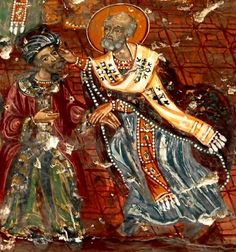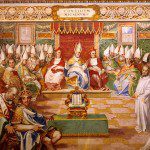


I lectured today, at BYU Education Week, on the subject of “Athanasius and Arius,” focusing mostly on the Nicene Council of AD 325 and the Nicene Creed that emerged from it.
The victor at the Council, of course, was the future patriarch of Alexandria, eventually known as St. Athanasius the Great. And the loser was the Alexandrian presbyter Arius, who has been branded by the mainstream Christian tradition ever since as a heretic (or even “arch-heretic”).
The Council of Nicaea wasn’t always (or ever?) a sedate and serene deliberative assembly. One of my favorite scenes is when St. Nicholas of Myra, a town in what is today southern coastal Turkey, becomes so enraged with Arius that he marches up to him while he’s speaking and decks him.
And here’s a description of Arius’s death, in AD 336, given by Socrates Scholasticus, a furiously anti-Arian writer of the following century, that was — be warned! — carefully crafted to make that death as disgusting and undignified as possible:
It was then Saturday, and Arius was expecting to assemble with the church on the day following: but divine retribution overtook his daring criminalities. For going out of the imperial palace, attended by a crowd of Eusebian partisans like guards, he paraded proudly through the midst of the city, attracting the notice of all the people. As he approached the place called Constantine’s Forum, where the column of porphyry is erected, a terror arising from the remorse of conscience seized Arius, and with the terror a violent relaxation of the bowels: he therefore enquired whether there was a convenient place near, and being directed to the back of Constantine’s Forum, he hastened thither. Soon after a faintness came over him, and together with the evacuations his bowels protruded, followed by a copious hemorrhage, and the descent of the smaller intestines: moreover portions of his spleen and liver were brought off in the effusion of blood, so that he almost immediately died. The scene of this catastrophe still is shown at Constantinople, as I have said, behind the shambles in the colonnade: and, by persons going by pointing the finger at the place, there is a perpetual remembrance preserved of this extraordinary kind of death.
Ancient devotees of the Nicene Creed felt that Arius’s sudden death was a divine miracle. God smote the sinner. Some modern scholars, by contrast, suggest that Arius was poisoned by the Nicene Trinitarian faction.
But let’s not be morose. To cheer things up, it’s time to roll out a favorite joke yet again. It’s by Emo Philips, but I’ve modified it very, very slightly for stylistic reasons:
Once I saw this guy on a bridge about to jump.
I said, “Don’t do it!”
He said, “Nobody loves me.”
I said, “God loves you. Do you believe in God?”
He said, “Yes.”
I said, “Are you a Christian or a Jew?”
He said, “A Christian.”
I said, “Me, too! Protestant or Catholic?”
He said, “Protestant.”
I said, “Me, too! What denomination?”
He said, “Baptist.”
I said, “Me, too! Northern Baptist or Southern Baptist?”
He said, “Northern Baptist.”
I said, “Me, too! Northern Conservative Baptist or Northern Liberal Baptist?”
He said, “Northern Conservative Baptist.”
I said, “Me, too! Northern Conservative Baptist Great Lakes Region, or Northern Conservative Baptist Eastern Region?”
He said, “Northern Conservative Baptist Great Lakes Region.”
I said, “Me, too! Northern Conservative Baptist Great Lakes Region Council of 1879, or Northern Conservative Baptist Great Lakes Region Council of 1912?”
He said, “Northern Conservative Baptist Great Lakes Region Council of 1912.”
I said, “Die, heretic!” And I pushed him over.












